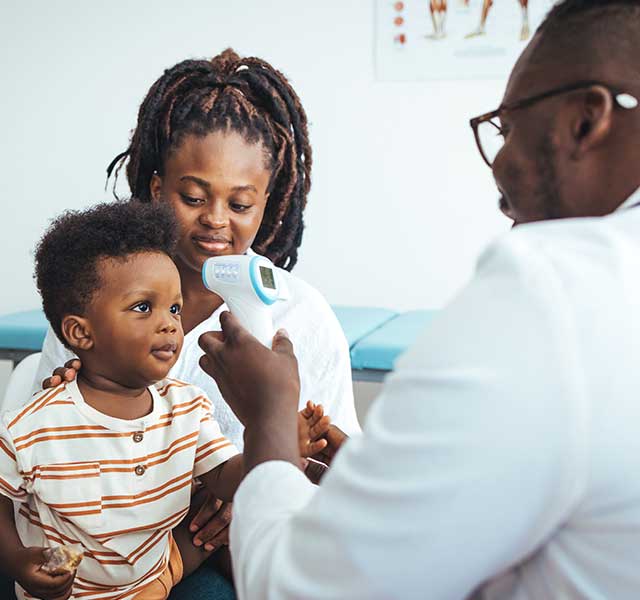If your child is sniffling, coughing or just feeling yucky, it may be an upper respiratory infection (URI). You might be tempted to ask your child’s doctor for antibiotics to help your kiddo recover more quickly. But will they work?
Not necessarily. Upper respiratory infections can be caused by viruses or bacteria—and there’s an important difference in how the two are treated. “Antibiotics attack bacteria and not viruses,” explains Amanda V. Haladik, DO, FAAP, a pediatrician at Henry Ford Health. “They simply won't be effective against a lot of common viruses that circulate each year.”
So, what is the fastest way to get rid of an upper respiratory infection in kids? Before you seek treatment, it’s helpful to understand why viral and bacterial infections are so different and why antibiotics aren’t always the answer.
Two Types Of Upper Respiratory Illness
The respiratory system is made up of all the organs and tissues that help us breathe. URIs affect the upper parts of that system, including the throat and sinuses.
Most respiratory infections—including colds, croup, bronchiolitis, viral pneumonia—are caused by a variety of viruses. Some viruses, including influenza and RSV, cause specific illnesses. These infections can spread through coughing, sneezing or touching contaminated surfaces before you touch your eyes, nose or mouth.
Common childhood illnesses in kids caused by bacteria include ear infections, sinus infections, pneumonia and strep throat.
Most URIs in kids last seven to 10 days (though these illnesses can stretch out to two weeks). Regardless of the cause, URI symptoms in kids include some combination of:

Need A Pediatrician?
- Cough
- Fever
- General malaise (not feeling well)
- Nasal congestion
- Runny nose
- Sneezing
- Sore throat
“There's not always a specific symptom that will tell us if something is bacterial or viral,” says Dr. Haladik. “It’s a combination of hearing the patient's story, doing your exam and using your knowledge to make that decision. We have to decide as healthcare providers who warrants antibiotic treatment versus supportive care at home.”
Antibiotics For Respiratory Infections In Kids
Since most URIs are viral, your child will likely leave the doctor's office with orders to rest up.
However, if the illness doesn’t follow the expected course or symptoms worsen, Dr. Haladik advises a follow-up visit. Some viral infections can progress to bacterial URIs, so it’s always a good idea to call your pediatrician if a bug doesn’t budge. Depending on symptoms, your child’s doctor may be able to test for a bacterial infection such as strep throat.
If your child has a bacterial infection, the doctor will prescribe antibiotics designed to kill the bacteria most likely causing it. Because antibiotics are powerful medications, doctors prescribe them with care. Antibiotics can have unpleasant side effects, including stomach pain, nausea, vomiting, diarrhea and rashes. And antibiotic overuse can cause bacteria to become resistant to those medications.
“If antibiotics keep getting used inappropriately when people are just suffering from viral infections, the antibiotics we are using today won't necessarily work as well against common infections in the future,” explains Dr. Haladik.
Home Care For URIs In Kids
Whether the infection is viral or bacterial, your child will need some TLC at home, including:
- Children’s acetaminophen or ibuprofen (for ages 6 months and older) to manage pain and fever
- Fluids
- Honey (for children over 1 year of age) to help with cough
- Humidifiers
- Nasal saline
- Rest
Regardless of when your child became sick or what the cause of the infection is, call your pediatrician if they experience any of the following symptoms:
- Acting very tired
- Difficulty breathing or rapid breathing
- High or prolonged fever
- Signs of dehydration, including not being able to drink normally, crying without tears or not peeing regularly.
Stay Healthy This Season
In addition to routine preventative measures this coming cold and flu season (i.e., hand washing, covering coughs and sneezes, washing surfaces and staying home when you're sick), make sure your child is up to date on routine vaccinations.
“Vaccines are one of the best ways to protect your child against severe illness. In addition to those routine vaccines, this could include vaccination for COVID and the flu,” says Dr. Haladik. “During the COVID pandemic, people fell behind on routine childhood visits. Schedule a well-check with your child's doctor if they haven't had one within the past year."
Reviewed by Amanda V. Haladik, DO, FAAP, a pediatrician who sees patients at Henry Ford Medical Center - Lakeside and Henry Ford Medical Center - Sterling Heights.



